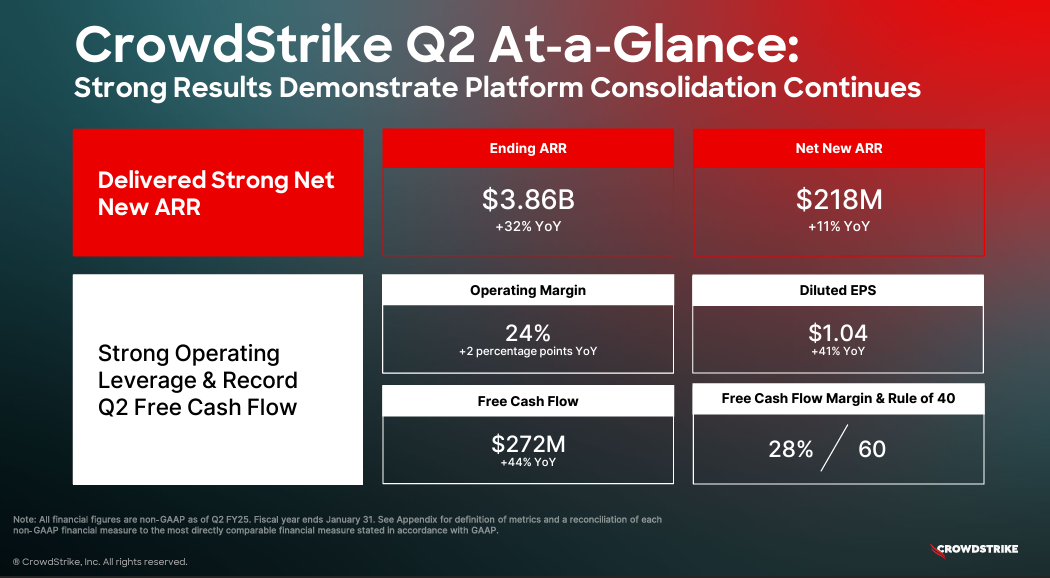CrowdStrike said it will take a $30 million subscription revenue impact for the third quarter and each of the remaining fiscal quarters in the fiscal year due to its recent outage. Fiscal 2025 revenue guidance “includes an estimated impact in the high-single digit millions to professional services revenue in the second half of fiscal year 2025.”
The security vendor said third quarter revenue will be between $979.2 million to $984.7 million with non-GAAP earnings of 80 cents a share to 81 cents a share. Fiscal 2025 revenue will be between $3.89 billion to $3.9 billion with non-GAAP earnings of $3.61 a share to $3.65 a share.
The outlook was the big theme as investors were looking for some quantification due to the outage. For the second quarter, CrowdStrike reported net income of $47 billion, or 19 cents a share, on revenue of $963.9 million, up 32% from a year ago. Non-GAAAP earnings were $1.04 a share in the second quarter.
Wall Street was expecting CrowdStrike to report second quarter non-GAAP earnings of 97 cents a share on revenue of $958.32 million.
Going into the results, all eyes were on CrowdStrike’s orders and potential liability due to its outage. The headlines haven’t been kind to CrowdStrike and rivals Palo Alto Networks and SentinelOne said they have seen a pickup in interest following the outage.
CrowdStrike outage fallout:
- SentinelOne CEO: 'We're seeing distinct rise in customer interest' after CrowdStrike
- Palo Alto Networks reports strong Q4, raises outlook on platformization play
- CrowdStrike to Delta: Don't blame us for your IT outage response
- From Blue Screen to Blackout: Unpacking the CrowdStrike Catastrophe and Industry Implications
- CrowdStrike outage likely to hit cybersecurity's platformization pitch
- Cybersecurity platformization: What you need to know
In a LinkedIn post, CrowdStrike CEO George Kurtz said:
"Our LogScale Next-Gen SIEM, identity protection, and cloud security hypergrowth businesses together surpassed $1 billion in ending ARR, growing more than 85% YoY. These results showcase CrowdStrike as cybersecurity’s AI-native consolidation platform of choice. Through our Falcon Flex licensing model, customers are adopting more of the Falcon platform than ever before."
That comment speaks to platformization and next-gen SIEM vendors consolidating, said Constellation Research analyst Chirag Mehta.
The company said that the July 19 outage landed in the last two weeks of the quarter and it delayed deals. Most of those deals remain in CrowdStrike's pipeline.
Speaking on a conference call, Kurtz said CrowdStrike has implemented new controls to prevent an outage. He apologized to customers and said:
"We've already implemented the following actions to build a more resilient Falcon platform. This ongoing work focuses on enhancing security and resiliency over the short, medium and long term."
Specifically, Kurtz said the company has done the following:
- Enhance content visibility and controls. The company has released new content control configurations.
- Content QA enhancements with a new content validator and interpreter to prevent erroneous content.
- Improved content release process to mirror what CrowdStrike does with sensors.
"The July 19 incident starts a new chapter for CrowdStrike," said Kurtz. "We've immediately addressed learnings from the incident, and will continue to apply and evolve these lessons into our future."
Two key quotes from Kurtz on the CrowdStrike earnings call are worth noting because they address durability of the business as well as the Microsoft relationship.
- "Obviously, there's a lot of noise in the marketplace and we can only control what we can control, and I think the best way for me to articulate that is to just recount some of the conversations. I had two customer calls this morning and most of them start out the same. They talk about our response, how transparent we were, and how we dealt with the problem. We talked about some of the mitigating steps that we've taken and it generally ends with we want to do more with CrowdStrike. I had one this morning, which was a customer that had an impact, we talked through it. They were satisfied with the controls we put in place, and in fact, on the call, they basically said we won the next-gen SIEM project they had, which we won against another next-gen SIEM competitor. So this is what we're seeing."
- "We'll continue to work with Microsoft as part of the ecosystem as they look to provide further enhancements around kernel access, but just to be clear, there are thousands of software kernel drivers that are out there that go well beyond security, like VPN, virtualization software, IT management software, backup software and a lot more. So we are one part of the ecosystem, and we're certainly a player that's going to help and work with Microsoft as they think about adding other mechanisms to allow the ecosystem to flourish."



